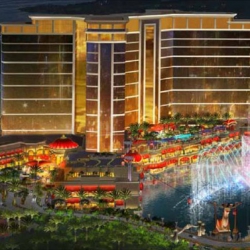
The questions are whether Wynn Palace is designed for the current gaming market in Macau, and whether China’s economy is set for a turnaround.
Though some of the financial news has been good for the Las Vegas casino company, several prominent financial analysts have questioned whether Wynn Resorts’s relatively positive financial numbers are sustainable in the near future. Wynn Resorts released a quarterly report earlier in May which showed better-than-expected earnings. Investors took the news as good and stock prices increased in the days since.
The Motley Fool investment service argues that those numbers obscure a darker overall picture. The Fool wrote a column which discussed the upcoming opening of the $4 billion Wynn Palace in Macau. The question was whether the Wynn Palace is good news or bad news for Steve Wynn’s gaming and leisure corporation.
VIP High Rollers in Macau
Everyone agrees on a few facts. Macau’s VIP high rollers are not likely to return to pre-2014 numbers again anytime soon. The Beijing government’s nationwide corruption crackdown, which was launched by President Xi Jinping in 2013, finally reached Macau in mid-2013. The junket operators who underpinned Macau’s high roller industry were placed under scrutiny. Their black market credit system was scrutinized, as were their ties to Chinese organized crime syndicates known as triads.
Credit card payment services were investigated, showing money laundering and attempts to get Chinese currency out of the country, perhaps in the hopes that corrupt executives and Community Party officials likely to be investigated could plan an escape out of the country.
This had a cooling effect on Macau’s casino industry, which has seen 23 straight months of decline. Macau officials got the word from Beijing in a December 2014 speech made by Xi Jinping, who suggested the former Portuguese gaming enclave needed to diversify its economy. With passport restrictions, high rollers are not likely to come back.
Rich Duprey on Wynn Resorts Stock
Analysts like Rich Duprey also point out that Wynn Resorts collects 60% of its revenues from its Macau gaming properties. As Macau goes, so goes Wynn Resorts. With that in mind, the above logic suggests that Wynn Resorts cannot expect a major turnaround anytime soon.
The Wynn Palace thus becomes a $4 billion wager, according to the Motley Fool. Wynn Resorts focused more on VIP high rollers than other Macau operator. Wynn Palace is an opulent location, but one wonders if it is not opening in a gaming environment not conducive to high stakes gambling.
One can hardly blame Steve Wynn and his executives. The Wynn Palace was planned years ago, long before Xi Jinping’s crackdown began to threaten high rollers and their clients. A gaming executive tends to have a bold vision for the future, always looking for new horizons of gaming revenue. The Cotai Peninsula looked like a sure bet 5 years ago, or even 2-3 years ago.
Steve Wynn’s Adjustement to the Market
Despite his general propensity to focus on high rollers, Steve Wynn is no fool. He has seen the writing on the wall in China for more than a year now. With his biggest casino yet in its planning stage, it is possible he has tailored the design more for the Chinese mass market players, who all must see as the future of Macau gaming.
If so, then Wynn Resorts might modify their development on the Cotai Peninsula to appear more to the Chinese middle class. China has the largest middle class in the history of the world now, so targeting that segment might produce healthy returns — even if they are not as glamorous or profitable as the high rollers were in the good times.
Amenities for Mass Market Players
There are indications that Wynn Palace is attempting to appeal to mass market players more than similar Wynn venues would have in the past. Mass market players are more likely to bring their families on vacations. The Wynn Palace has an 8-acre “performance lake”. Access to the performance lake is provided by a light rail station and an air-conditioned SkyCab.
The aerial transport system is going to have gondolas shapes like dragons (who breathe smoke). Hot air balloons and pedestal gardens are going to provide additional viewing opportunities for what amounts to a 30,000 square meter landmark. If remotely affordable, such an attraction should be popular with the Chinese middle class, who want to take vacations like the new American middle class did in the 1950s — to spend their newfound wealth and see the wider world.
Questions about the Chinese Economy
The question is: will the Chinese middle class continue to grow as it has in the past 10 years? The Chinese economy has slowed down and people wonder whether it’s a temporary or permanent trend. The Chinese middle class might be concerned of falling out of their relative economic prosperity. If so, they might take austerity measures and avoid expensive vacation spots.
Wynn Resorts needs the Chinese economy to get healthy again. One has to wonder if the corruption crackdowns are a part of Xi Jinping’s domestic political agenda. The Chinese government would not be the first one in history to look for domestic scapegoats and external rivals to blame, when the economy turned bad. Russia and the United States have exhibited those traits in the recent past. If the economy gets better, then Xi Jinping might be less vehement in his purges.
Thus, the success of the Wynn Palace might well come down to the state of the Chinese economy overall. Investors should scale back their upside, but if you believe in the Chinese economy, then scaling back the downside predictions a bit might be in order.
